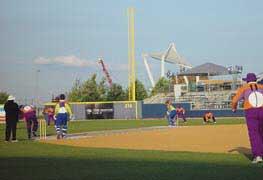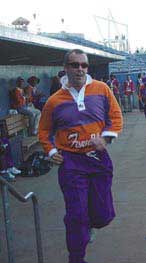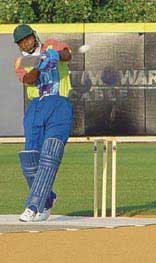Magazine
Take me to the Ballpark, Oya! Hoya

ProCricket, in America, of all places?.
|
Purple, red, green and blue for the eyes, running commentary and Punjabi rap for the ears, nachos and cheese for the taste buds, the pleasant smell of fresh cut grass and an uncharacteristic Houston breeze on the skin.
I wouldn’t be far off mark if I said that the American ProCricket match at the University of Houston Cougar Field on Saturday, July 17, was a treat for all the senses. Three hours packed with a quick-fire century, a couple of bouncers, two-thirds of a hat-trick, a dropped catch, several bowled wickets and innumerable fours and sixers. Purists can take a hike. ProCricket is in! American ProCricket is a bold attempt to introduce cricket to mainstream America. Modified to suit the American psyche, the matches are played in the Twenty20 format that was initially developed in England, and include five-ball overs and the “designated hitter” rule borrowed from baseball. Kalpesh (Kal) Patel, the chairman, commissioner and founder of the American ProCricket League (www.procricket.com), has succeeded in involving former Indian test cricketer and Indian national team ex-coach Anshuman Gaekwad as executive director and Australian cricketer Robert Smith as assistant commissioner in his venture. They have roped in about 40 international cricketers, who will play alongside 120 local players from different cities. The league comprises of eight teams: New York Storm, New Jersey Fire, Florida Thunder, DC Forward, Texas Arrowheads, Chicago Tornadoes, Los Angeles Unity and San Francisco Freedom. Indian American businessman Kamal Verma owns the operating rights to all the teams in the league – Yankees owner George Steinbrenner take note!
The league seeks to promote the game purely as a form of entertainment and the matches are played only over weekends. The aim is to provide an ambience where grown-ups as well as kids can have wholesome fun at a reasonable price, presently $5. But they weren’t lacking for passion. “Take me out to the ball game” was substituted by Indian masala music and the action on the field was more “fast n furious” than a five home-run game. As the Texas Arrowheads in red, white and blue took on the Chicago Tornadoes in purple, green and white, the crowd was kept entertained from the first minute to the last. By the end of July, the teams had played 12 matches in six U.S. cities in New Jersey, New York, Washington D.C., San Francisco, Los Angeles and Houston. The regular season matches, played in minor league and college baseball parks, are scheduled to be completed by Aug. 21 and the play-offs will be held between Aug. 27 and Sept. 4. The international cricketers who took the field in Houston were Marlon Samuels, Franklyn Rose, Corey Collymore from the West Indies, Colin Miller and Richard Chee Quee from Australia and Nadeem Unis from Pakistan. The Chicago Tornadoes batted first and despite an early hat-trick chase by Collymore, came up with 157 runs in 20 overs. But it was when the Texas Arrowheads took the crease that the fireworks really began. Marlon Samuels hit the helpless bowlers in all directions to complete a century off just 40 balls. Then Franklyn Rose added more excitement by bowling a couple of bouncers and pretending to be turned-off by the batsman (a local player). Nevertheless, the Arrowheads reached the target easily in 15 overs, ending a truly exciting game well before schedule. The players definitely seemed to be enjoying themselves. Rose, fielding near the stands, obliged a number of fans with photos and autographs between overs. After the game he commented, “I’m loving it! This is fun. I’ve never done anything like this before in my life. It’s totally different from the Caribbean and England and everywhere in the world. It’s good to see the kids come out and have fun too.” The international players rotate between teams. Marlon Samuels played for the New York Storm before changing colors and padding up for Texas. He has just been named among the West Indies probables for the ICC Champions Trophy, after a six-month layoff due to knee surgery, and appeared to be having the time of his life too. “I’ve got two centuries (in ProCricket) already and am looking for a third one. I’m leaving a statement. Something for people to remember me by,” he said with a smile. For the local players it is a learning experience playing with players of such high caliber. Do they feel second class? Says Ankit Mehta, a player in the Texas squad, “They (the stars) are easy to get along with. There is no pressure.” Texas captain Alpesh Patel, who has played for the Kenya A team, as well as Kuldip Patel, the Texas manager, concur. “They are a bunch of nice guys and it’s fun playing with them. It doesn’t feel like they are on a different level.” Although the players and the fans that show up are obviously having a lot of fun, ProCricket has got off to a tepid start. The response in New Jersey was relatively good, according to Kal Patel, with over 2,000 people turning up for one of the matches.
In Houston, few people were aware of the match featuring international players. Most heard of it through word of mouth and many others by pure chance. A Britisher, who had brought along three American friends, all of them new to the game, had read about ProCricket on the BBC website and investigated further of his own accord. But on the positive side, his American companions to the game found this version of cricket “more exciting and faster than baseball.” ProCricket is a brave initiative. Patel, Verma, Gaekwad and Smith all claim to be focused full time on the project. The league is fully owned by Patel, who claims to have invested what he calls a “small fortune” – in the millions he allows when pressed. Local players typically receive $150 for a game, apart from travel, lodging and meal expenses. Some international players receive “a few thousand dollars” for 10 days; some volunteer. Patel says he has enough financial backing for the project to run the league for three years, even without anyone showing up at the ballpark. He has 3-, 5- and 10-year business plans on the ready, but has enough business savvy to know that the picture will not be fuzzy in three years. He also knows that he is pushing uphill for ProCricket to reach out to a wide audience. The matches are currently being shown on DISH Network Pay Per View. The organizers say they have plans to telecast the games on American Desi, an upcoming national network channel, which could provide ProCricket with much needed publicity. Then there is the issue of the Board of Control for Cricket in India (BCCI). Ajay Jadeja and some other Indian players withdrew from ProCricket after BCCI barred players from participating. Patel says he is puzzled by BCCI’s attitude as the International Cricket Council is not opposed to ProCricket. But it is a serious setback for the league, which would benefit hugely from the presence of Indian players to draw desi crowds. Despite the hurdles, Patel is excited about the future of the organization and cricket in America. It’s a hope shared by thousands of cricket fans who miss the action in America. |




You must be logged in to post a comment Login